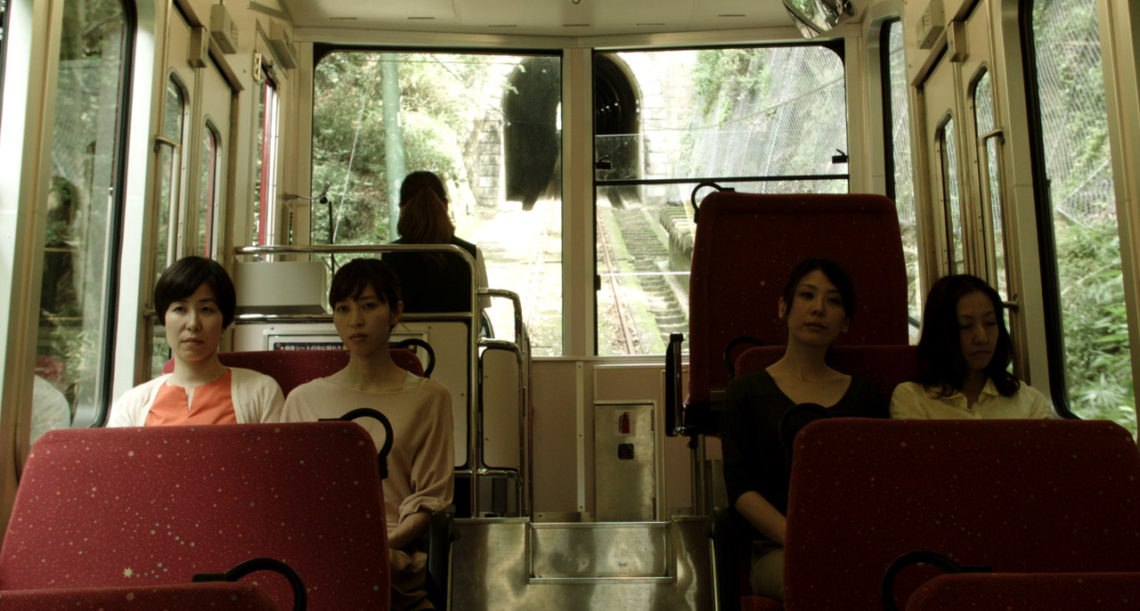On the surface, Ryûsuke Hamaguchi’s Happy Hour and Hirokazu Kore-eda’s Our Little Sister have much in common. Both are understated Japanese dramas centered on close-knit groups of women navigating changes in their professional, domestic, and romantic lives that cause their relationships with one another to shift. The films follow individual narrative threads but remain closely attuned to group dynamics; this is reflected in the shared spaces between characters. The two films are not packed with incident but structured around events that make up everyday life, and help mark the passage of time: shared meals, long workdays, weekend trips, chance encounters, funerals. In this way they both continue a tradition in Japanese cinema that dates back to Yasujirô Ozu’s earliest films, a tradition that Kore-eda has been working in now for years with such films as Nobody Knows (2004) and Still Walking (2008).
Yet more broadly, the films pursue opposite trajectories. Our Little Sister, based on the manga series Umimachi Diary by Akimi Yoshida, begins with its characters apart and ends with them peacefully united. Happy Hour, on the other hand, begins with characters traveling together in the same direction, but ends with one alone, another having disappeared, and the remaining two facing the sudden dissolution of romantic partnerships; they all face uncertain futures.
Happy Hour is structured around the friendship between four women in their mid-30s living in Kobe. When the film begins, the relationship between the quartet is still relatively new, though we learn early on that two of the women have been close since childhood. Hamaguchi introduces his central characters with a wonderfully simple, understated, yet theatrical flourish: a shot from the front of a tram goes up the side of a mountain (overlooking Kobe), then cuts to an interior shot when the train enters a tunnel. When the tram emerges from the other side, a burst of natural light illuminates Akari (Sachie Tanaka), Sakurako (Hazuki Kikuchi), Fumi (Maiko Mihara), and Jun (Rira Kawamura) sitting side-by-side, looking out at the view as they ride the train up to the top. The effect recalls stage lights fading up at the start of a play to show the actors already in their places. By the time they’ve reached their destination a few cuts later, the weather has soured and they’re enjoying a picnic underneath a gazebo surrounded by grey sky, the view they came to enjoy having been rained out. “This resembles our future,” Jun says wistfully. Akari chides her: “Hey, don’t be so dismal. The future for 37-year-old women is bright.” One of them mentions taking a trip to a nearby hot-spring resort and they all pull out their planners to find a weekend that works. They’ve all got their own lives to manage.
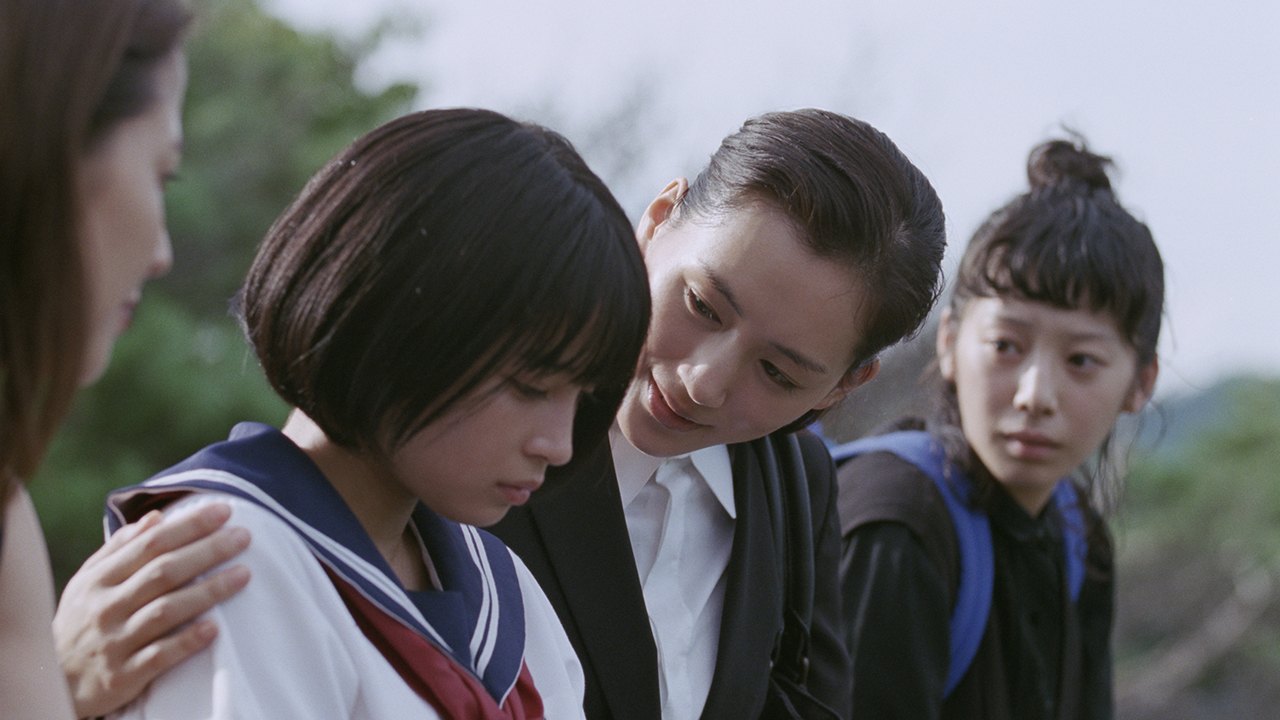
The women at the center of Our Little Sister know each other very well, being grown siblings still living together in the same old house. Sachi (Haruka Ayase) is the eldest and most responsible, having essentially raised her younger sisters after their father left and their mother proved incapable; Yoshino (Masami Nagasawa) is the middle sibling with a penchant for drinking too much and staying out late, and Chika (Kaho) is the youngest, still treated like a child even though she’s 19 and holding down a job at a sporting-goods store in town. As the film begins, they’re about to attend their estranged father’s funeral, and it’s there that they meet Suzu (Suzu Hirose), the 14-year-old half-sister who’s been living alone in a sleepy spa town, taking care of her dying father and her stepmother, still quietly mourning the loss of her own mother some years prior. Sachi is struck by Suzu’s maturity and poise when she greets them at the train station like an oddly serious tour guide in an elementary-school uniform, and so the eldest sister impulsively invites Suzu to come live with them, bringing her into a world of new food, friends, and family relationships. The arrangement of the sisters in the frame and around the girl-dormitory-like shared spaces is telling. Sachi is often positioned in the center of the tableau, befitting her status as the de facto head of the family. In contrast, Chika is first seen with her head poking out from her bedroom into the hallway, having just been roused from sleep, and soon she’s shoveling food into her mouth at the side of the breakfast table. The cartoonish aspect of such gestures is perhaps a nod to the graphic-novel origins of the story; they remain underplayed, Kore-eda fitting them into his characteristically low-key style, but they’re still much broader than anything in Happy Hour.
Hamaguchi’s film develops its characters through accumulated observation and nuance. Over the first hour, we learn several things about these characters. Jun is currently unemployed and in the process of divorcing her husband; she often wears an opaque, guarded smile. Akari works as a nurse and has been divorced; she can be a bit brusque but demands honesty. Sakurako labors at home to take care of her distant husband, her teenage son, and her newly moved-in mother-in law; she is very reserved but genuinely kind. Fumi helps run a fledgling local art space and is married to a literary magazine editor; she gives off an outward appearance of contentment. The sudden news of Jun’s divorce sends a shockwave through the friendship: Jun first tells Sakurako, her friend of 25 years, which results in Akari being hurt over their secrecy, and Jun’s subsequent confession of infidelity rubs salt in that wound. Ultimately, Jun’s admission causes each to take stock of their own lives and question the choices they’ve made.
This process unfolds gradually throughout the film, finding its rhythm in a long sequence in which the characters attend a “physical workshop” hosted at Fumi’s art space and led by Ukai (Shuhei Shibata), a conceptual artist who made a name for himself balancing large pieces of debris left by the Tohoku earthquake of 2011, and who now wants to work with people to help them find their own sense of balance. Hamaguchi (in collaboration with screenwriters Tadashi Nohara and Tomoyuki Takahashi) developed Happy Hour through a series of theatrical workshops held in Kobe and cast the film with local actors, so his devoting nearly an hour of the running time to the workshop and its consequent discussion between characters could be read as a tribute to that kind of process. Working with cinematographer Yoshio Kitagawa, Hamaguchi shoots the exercises with precise, intimate camera placement, which allows close attention to the subtle ways in which each person works through their apparent discomfort, skepticism, and confusion in their participation. The workshop sequence has led some critics to compare Happy Hour with the many extended troupe rehearsal scenes in Jacques Rivette’s marathon Out 1, but the primal-scream energy of the physical work represented there is replaced here by a quiet succession of exercises focusing on balance, interpersonal connection, and nonverbal communication.
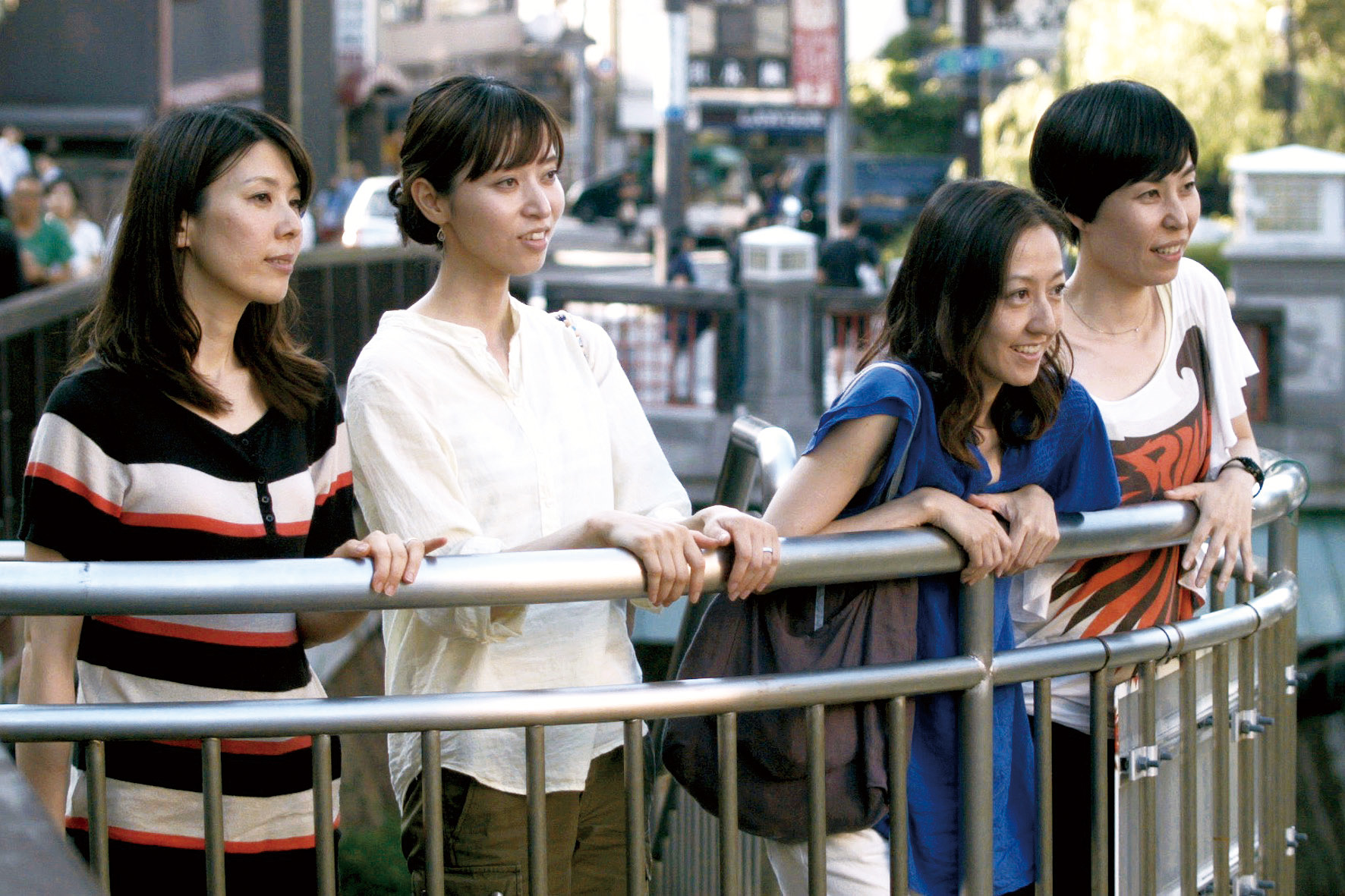
One exercise requires two people to face each other in order to align the “center lines” of their bodies, which Ukai demonstrates by swaying back and forth while his partner stands still. Hamaguchi shoots this from just behind Ukai, his partner facing the camera, so that the facilitator’s movement resembles a metronome, until he comes to rest in the center, now perfectly aligned. Then Hamaguchi cuts to a quick shot of Ukai in the center of the frame followed by a reverse shot of the partner in the center of the frame, both actors looking directly at the camera. It’s as if the exercise has briefly calibrated the film’s own sense of balance. Ukai asks the group to partner up, align their centers, and then walk in a circle, all the while maintaining eye contact and alignment, moving as one.
The prolongation of the workshop scene, plus the film’s 317-minute runtime, might cause some cinephiles to assume Happy Hour is a strenuous viewing experience. But it’s a commitment that Hamaguchi clearly appreciates and rewards, not with emotional catharsis or narrative payoff so much as a sense that our subjectivity as viewers is being acknowledged, engaged, and realigned throughout, much like the workshop participants. All we’re really asked to do is watch and listen; as Happy Hour demonstrates with its rare patience, attention and sensitivity, that can make all the difference.
This alignment is echoed much later in the film, when Jun abruptly leaves Kobe on a ferry. She and another character (unnamed to prevent spoilers) bid farewell. Then, Hamaguchi gives us a similarly matched pair of wide shots showing each person centered, their connection with one another undeniable. As the boat begins to depart, Hamaguchi pans slightly as if to reflect that same circular pattern practiced in Ukai’s exercise. But Jun is pulled away, and the motion that carries her is emphasized by a sequence of juxtaposing shots as she stands very still on the deck of the boat, the landscape of Kobe passing and finally disappearing behind her. In such moments, Happy Hour achieves a unique harmony in form, narrative, and theme that suggests a thrilling, novel sort of cinematic realism, precisely attuned to both the emotional life of the characters and the laws of motion that govern how people and things move through space. It is worlds away from the rigorous airlessness that characterizes much formalist cinema. At times the film seems to breathe.
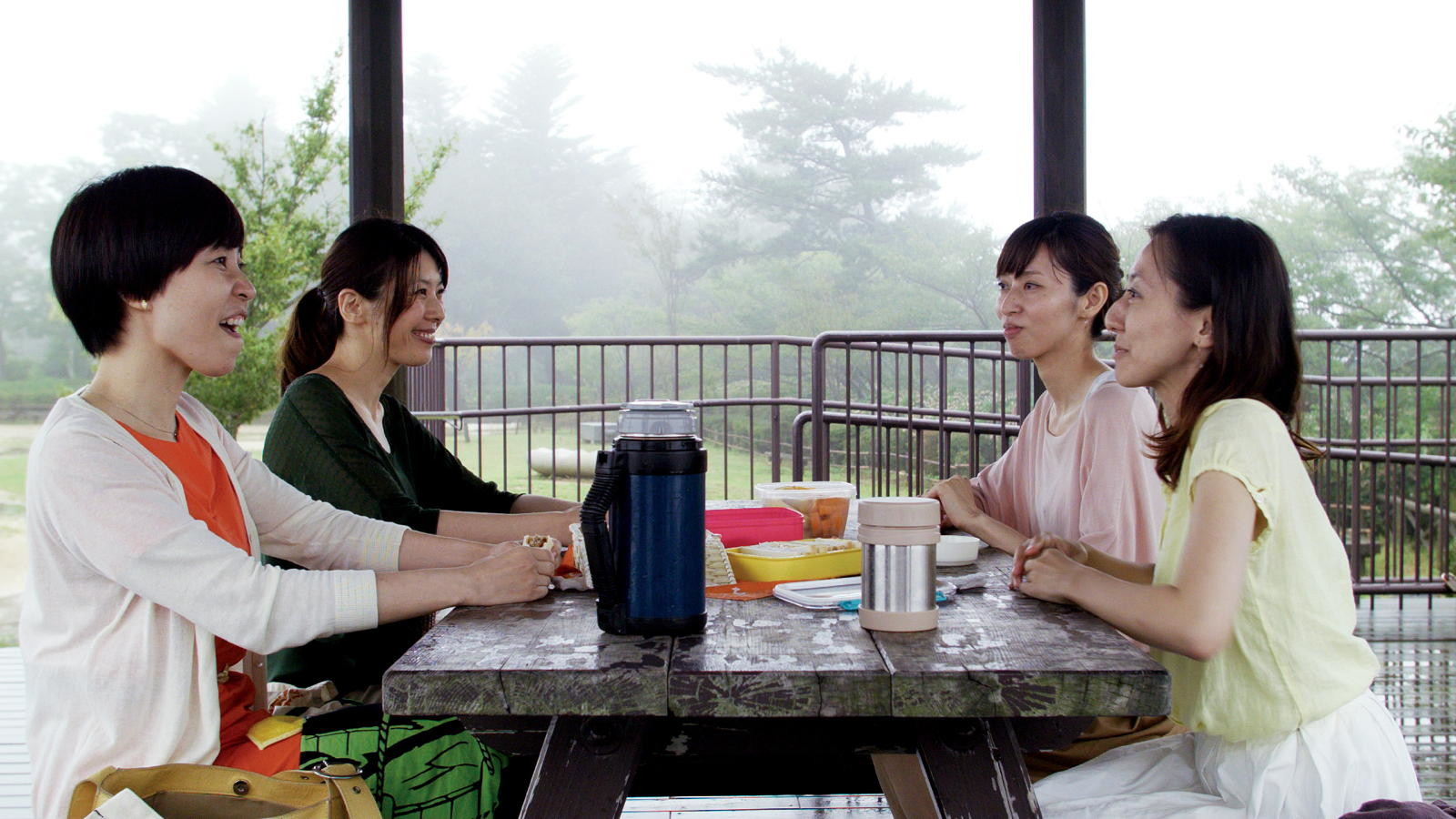
The use of natural light, as introduced in the opening gesture, is pivotal in the workshop sequence, as the sun goes down outside and the large windows at the front of the space darken. Hamaguchi’s temporal approach manifests not in long static takes or fluid, choreographed camera movements, but in sequences like the workshop, which appear to unfold in real time, naturally affecting the form of the film. As Vadim Rizov noted in his Filmmaker essay, Hamaguchi’s approach results in the room and everyone in it to be plunged into darkness, which is “completely unrelated to how anyone’s eyes actually work”—and so pure naturalism wouldn’t seem to be the goal. I prefer to view this as a formal extension of Happy Hour’s emphasis on communication, connection, and balance. Using unmotivated light to compensate for the gradual loss of light from outside would be a stylistic imposition on the environment that Hamaguchi does not seem to be interested in making.
The workshop sequence is a key to the film as a whole, establishing a vocabulary of formal gestures and thematic questions, deepening our understanding of each of the four women in their responses to one another and the exercises, and serving as a curiously indirect incitement of the film’s narrative. Just before the workshop, Jun tells Sakurako about the divorce; at the dinner after the workshop, the news comes out along with revelations about Jun’s infidelity and Akari’s own experiences with both divorce and infidelity. Yet even this reading is complicated by the gradual reveal that Ukai himself is a self-absorbed, aggressive, potentially violent man. Perhaps his insights regarding interpersonal connection are not to be trusted. Nevertheless, Hamaguchi formally follows through on Ukai’s ideas concerning balance, centeredness and intimacy throughout Happy Hour, as if to suggest the ways the experiences both of and surrounding the workshop linger in the minds of the four friends.
Some time after the workshop and Jun’s divorce trial, when the women take their planned spa trip, their changing perception of one another is reflected in a sequence of centered, Ozu-esque shots of each character directly facing the camera, essentially re-introducing themselves to the others (and to us). “I’ve known you for a long time. But it’s like I’m meeting you for the first time,” Sakurako tells Jun. Happy Hour is one of the best films I’ve seen to capture the ever-changing bond of friendship, which accounts for not only the constancy of change in personal lives, but the the invariable influence such changes play on relationships, especially close ones.
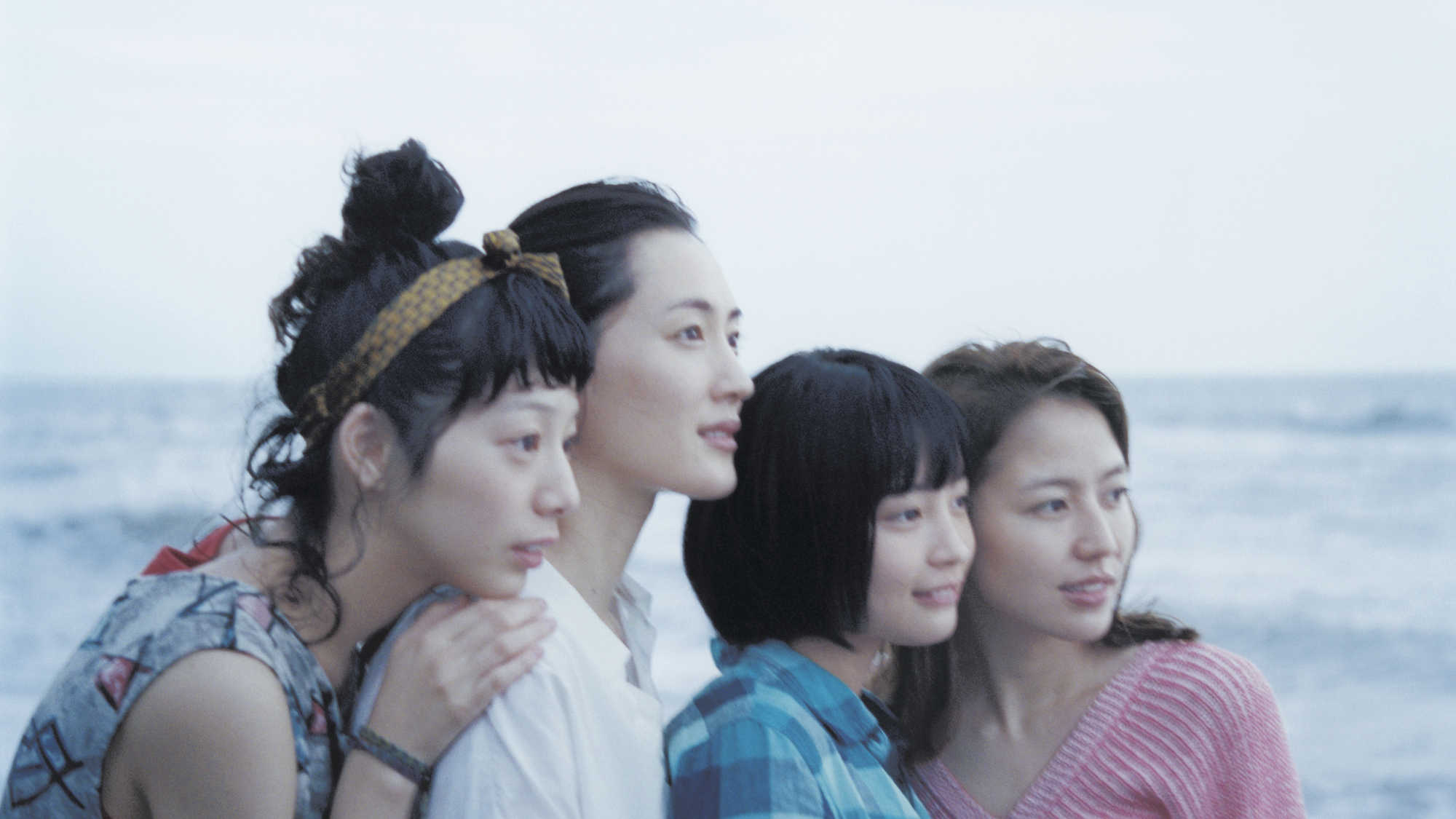
Friendship is also a major theme in Our Little Sister, and the heart of that film lies in the transition of young Suzu’s life as it becomes aligned with the lives of her half-sisters. Kore-eda symbolizes the sisterly alignment in a moment near the end, when Sachi marks Suzu’s height on the wall. The scene is punctuated with a shot of the new mark amidst old ones drawn on by the half-sisters in their younger days. Suzu has finally found a place where she belongs.
Our Little Sister is not as formally engaging as Happy Hour and plays in a more melodramatic emotional register. The achingly beautiful score by Yoko Kanno (Cowboy Bebop, Escaflowne) helps. Yet Kore-eda wisely handles the material with a lightness of touch that emphasizes sensory experience. Brief interludes, like a summer fireworks display seen from overhead, bursts of bright color reflected on the surface of the water, or a bike ride through a tunnel of overhanging cherry blossom branches, with the camera focusing on Suzu as the branch shadows pass over her face, languidly establish a poetic feeling.
Happy Hour and Our Little Sister both share an unbroken focus on the emotional lives of women, which is rarely seen in films directed by men. Happy Hour is particularly astute in showing how men obliviously put strain on those lives, requiring emotional labor from women by being self-absorbed, distant, or thoughtless. Jun is made to stand trial for wanting a divorce from her husband, her testimony of years of emotional abuse outweighed in court by the fact of her infidelity. (Crucially, she is also spatially centered here, facing the judge head-on with her friends just out of focus behind her. Her ex-husband stands to the side, watching. There is no alignment between them, and there can be no doubt she is the one on trial.) Men play less of a direct role in Our Little Sister, but the spectre of the absent father (described matter-of-factly by Sachi and others as “useless”) hangs over the film. Both Our Little Sister and Happy Hour focus on the nurturing relationships between women, at any rate: the all-female ensembles come to center themselves, overcome stasis, and find greater balance in their lives by primarily connecting with one another, sister to sister, friend to friend.

















